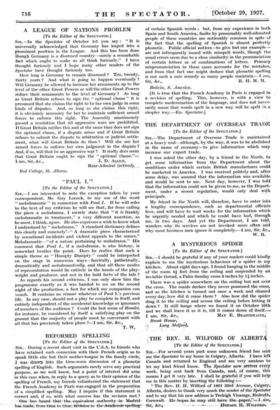"PAUL I."
[To the Editor of the SPECTATOR.] SIR,—I am interested to note the exception taken by your correspondent, Mr. Guy Locock, to my use of the word " melodramatic " in connexion with Paul I. If he will refer to the text of my criticism he will see that, far from calling the piece a melodrama, I merely state that "it is frankly melodramatic in treatment," a very different assertion, as he must, I think, agree. He also expresses a wish to know what I understand by " melodrama." A standard dictionary defines this clearly and concisely" A dramatic piece characterized by sensational incidents and violent appeals to the senses." Melodramatic--" of a nature pertaining to melodrama." His comment that Paul I., if a melodrama, is also history, is somewhat besides the point. Does he realize that such a simple theme as " Humpty Dumpty " could be interpreted on the stage in numerous ways—farcidally, pathetically, dramatically and melodramatically, and that all these modes of representation would lie entirely in the hands of the play- wright and producer, and not in the bald facts of the tale ?
As regards his second criticism, I can only show him the programme exactly as it was handed to me on the second night of the production, a fact for which Illy companion can vouch. It contains no résumé whatever of Paul I's previous life. In any case, should not a play be complete in itself, and entirely independent of the accidental knowledge or ignorance of members of the audience ? Could the last scene of Hamlet, for instance, be considered by itself a satisfying play on the ground that the majority of people must be conversant with
all that has previously taken place ?—I am; Sir, &c., -


























































 Previous page
Previous page